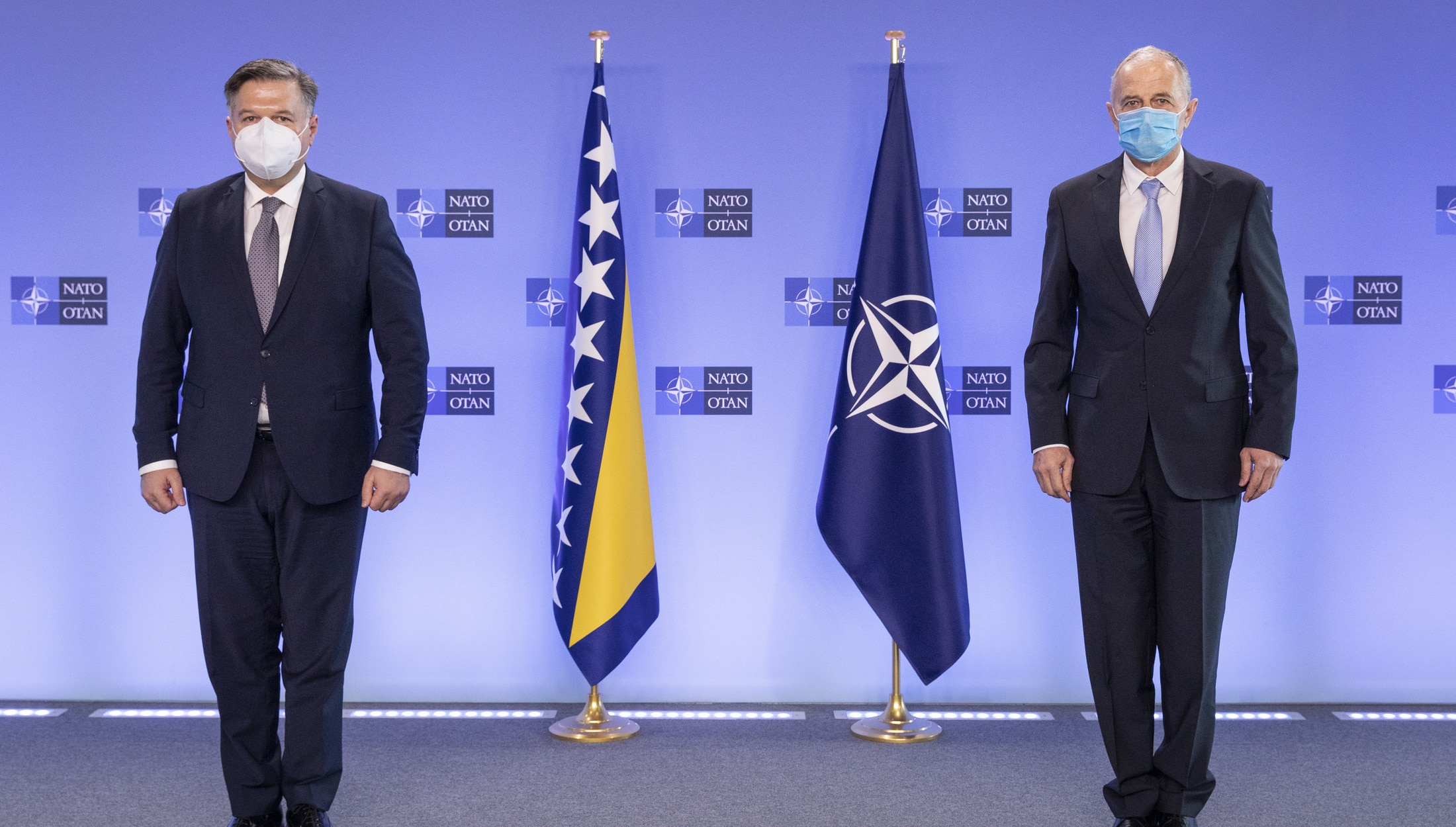Deputy Minister of Foreign Affairs of Bosnia and Herzegovina, Josip Brkić, visits NATO headquarters to meet with NATO Deputy Secretary General Mircea Geoană
On the 18th and 19th of March, NATO and Bosnia-Herzegovina responded to threating statements made by Russia about Bosnia’s accession to the Alliance. Russia has long been opposed to Bosnia joining NATO. Observers warn of growing conflict between the West and Russia over the Western Balkans.
Bosnia-Herzegovina’s accession to NATO
Bosnia-Herzegovina, together with Serbia, is one of the only two Western Balkan countries that remain outside NATO after North Macedonia joined the alliance last year.
Bosnia has long proclaimed integration with NATO and the European Union as strategic goals. In 2018, Bosnia was admitted to the Membership Action Program and a year later, the country adopted a program of political, security, and defence reforms, preparing itself for NATO membership.
However, the multi-ethnic country is deeply divided over the merits of joining the alliance. The Bosnian Serbs, led by pro-Russian Milorad Dodik who currently chairs the country’s tripartite presidency, want the country to remain neutral and stay out of the US-led military alliance. Meanwhile, most Bosniaks and Bosnian Croats are in favour.
On Thursday, the 18th of March, NATO Deputy Secretary General Mircea Geoană spoke about the issue at an international conference. He talked about the development of relations between NATO and Bosnia and Herzegovina and underscored NATO’s firm support to Bosnia and Herzegovina’s ongoing efforts to reform their defence and security institutions. At the same time, he emphasised: “Our cooperation does not prejudge any potential future NATO membership for Bosnia and Herzegovina. And we fully respect the country’s sovereignty and independence.”
Russia’s opposition
The Russian embassy in Bosnia released a statement about Bosnian accession on March 18th: “In the case of practical rapprochement of Bosnia and Herzegovina and NATO, our country will have to react to this hostile act.”
Russia has long maintained its opposition to Bosnia-Herzegovina joining NATO. It further said in its statement that NATO’s purpose is a “fight against Russia” and joining NATO will force Sarajevo to take a side in the “military-political confrontation”.
The Russian embassy said its statement was “a reaction to several publications praising the benefits of Bosnia’s NATO membership”, but did not clarify which publications it meant. The statement came on the same day as Geoană’s speech, and a day after a Commission for Cooperation with NATO was constituted in Bosnia.
NATO and Bosnia respond
NATO hit back on Friday the 19th. Each country has the sovereign right to choose its security arrangements, the Alliance said, adding that whether countries choose to cooperate with NATO – through a partnership or as a full member – depends on each applicant and the allied members. “No third party has the right to intervene or veto such a process,” a NATO spokeswoman said on Friday.
The Croat member of the three-man Bosnian presidency, Zeljko Komsic, responded to the embassy’s statement on Friday. Komsic said that “twisted threats” from the Russian embassy were not acceptable, and that the position of the Russian embassy, and of the Foreign Ministry of Russia, was “the continuity of their activities towards all countries that have a desire to join NATO”.
More diplomatic and political work
Earlier in March, former NATO Senior Military Commander in Europe, Philip Breedlove, already predicted that this year would be a year of growing conflict between the West and Russia over the Western Balkans, in particular Serbia and Bosnia–Herzegovina.
“This year will be tainted by the escalation of conflicts between the West and Russia over the future of Southeast Europe,” Breedlove said. “Moscow will continue to strongly oppose Bosnia-Herzegovina’s progress towards the European Union.”
He called on current NATO leadership to show more immediate concern with the developments, and respond with diplomatic and political work in the region.
Sources: NATO, Reuters, BalkanInsight, balkaneu.com
Image: NATO



